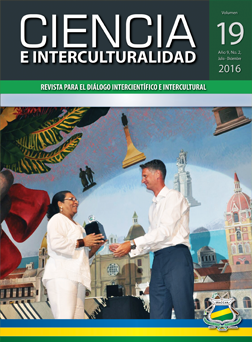Sistema médico tradicional- ancestral en el territorio de los Pastos Resguardo Indígena de Túquerres-Narino, Colombia
Palabras clave:
medicina tradicional, espiritualidad, cosmovisión, identidad.Resumen
Se ha analizado el sistema médico tradicional en el territorio de los Pastos, Resguardo Indígena de Túquerres, Nariño, Colombia. Para los indígenas, la salud es producto de la relación armónica entre naturaleza, seres humanos y el mundo espiritual, al romperse uno de estos tres nexos, el cuerpo se enferma afectando tanto al individuo como a la familia.
El enfoque fue hermenéutico en la comprensión de las prácticas de los comunitarios relacionadas con la medicina tradicional. La unidad de estudio fue la totalidad de médicos tradicionales (19), entre los cuales hay hierbateros, espirituales, yageceros y parteras. Los resultados han reflejado que la práctica de la medicina tradicional, que en el caso del Estado, algunos sectores de la Iglesia e Instituciones prestadoras de salud no aceptan esta práctica ancestral, persiguiendo al médico tradicional acusándolo de hechicero, embustero y mentiroso.
Existen dos categorías de médicos tradicionales: los espirituales y los del cuerpo. Entre las más enfermedades más frecuentes del cuerpo está la gastritis, la úlcera, apendicitis, mal de vesícula, cáncer, fracturas y luxaciones. Entre las espirituales: el espanto, el mal viento, el miado del cueche, el maleficio y enfermedades que denominan “del alma”, como la envidia, la soledad, la tristeza, el egoísmo.
El tratamiento va acompañado con un ritual. Para las espirituales se purifica a la persona y el entorno con sahumerio, se invoca a Dios y naturaleza, sol, agua, y los espíritus mayores. La percepción comunal: consideran que la medicina tradicional es una alternativa para la salud del cuerpo y el espíritu a través de plantas.
Summary
We have analyzed the traditional medical system in Los Pastos territory, Indigenous Reservation of Tuquerres, Nariño, Colombia. For indigenous people, health is a product of the harmonious relationship between nature, human beings and the spiritual world, so when one of these three links breaks, the body becomes sick, affecting both the individual and the family.
We use a hermeneutical approach to understand the community practices related to traditional medicine. The unit of study was the entire traditional doctors (19), among whom we can mention herbalist’s (bush doctors), spiritualist, medicine man (yageceros) and midwives. The results have reflected that the practice of traditional medicine, in the case of the State, some sectors of the Church and institutions that provides health care do not accept this ancestral practice, but rather they chase the traditional doctor accusing him as a witch doctor, a deceitful and a liar.
There are two categories of traditional doctors: those that address the spiritual part and those that attends the body. Among the most common diseases of the body we can find gastritis, ulcer, appendicitis, vesicle disease, cancer, fractures and dislocations. Between the spiritual ones: the fright, the bad wind, the piss of the cueche, the curse and those known as the “diseases of the soul”, like the envy, the loneliness, the sadness and the selfishness.
The treatment is accompanied with a ritual. For the spiritual ones the person and the environment are purified with incense, while they invokes God and nature, sun, water, as well as the greater spirits. On the other side, the communal perception considers that the traditional medicine is an alternative for the health of the body and the spirit through plants.

